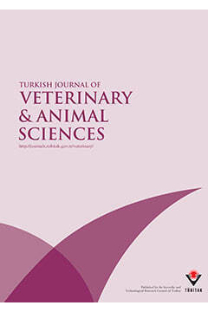Propionibacterium strain P5' in vitro uçucu yağ asitleri üretimi, ham sellüloz ve nişasta sindirimi üzerine etkileri
The objectives of this study were to determine whether Propionibacterium affects in-vitro VFA production and/or increases the digestibility of fiber and starch. A 4 x 4 x 4 factorial arrangement was used. The main factors were feed source, length of fermentation, and level of added Propionibacterium. Fermentations were conducted in batch cultures with Propionibacterium added to the flasks just prior to the addition of rumen inoculum. The total VFA, acetate, and propionate concentrations increased 9, 5, and 18%, respectively with the addition of Propionibacterium. Propionibacterium decreased dry-matter digestibility by 2% and fiber digestibility by 14%. A second study was conducted to examine the effect of pre-hydration and the carrier of the Propionibacterium on in-vitro fermentation. All levels of Propionibacterium were examined again. The acetate and propionate concentrations decreased by 5% when Propionibacterium was autoclaved; however, autoclaving did not increase dry-matter or fiber digestibility when compared to Propionibacterium alone. Propionibacterium increased the total VFA, acetate, and propionate concentrations, and therefore may enhance the performance of ruminant livestock.
Effects of Propionibacterium strain P5 on in-vitrro volatile fatty acids production and digestibility of fiber and starch
The objectives of this study were to determine whether Propionibacterium affects in-vitro VFA production and/or increases the digestibility of fiber and starch. A 4 x 4 x 4 factorial arrangement was used. The main factors were feed source, length of fermentation, and level of added Propionibacterium. Fermentations were conducted in batch cultures with Propionibacterium added to the flasks just prior to the addition of rumen inoculum. The total VFA, acetate, and propionate concentrations increased 9, 5, and 18%, respectively with the addition of Propionibacterium. Propionibacterium decreased dry-matter digestibility by 2% and fiber digestibility by 14%. A second study was conducted to examine the effect of pre-hydration and the carrier of the Propionibacterium on in-vitro fermentation. All levels of Propionibacterium were examined again. The acetate and propionate concentrations decreased by 5% when Propionibacterium was autoclaved; however, autoclaving did not increase dry-matter or fiber digestibility when compared to Propionibacterium alone. Propionibacterium increased the total VFA, acetate, and propionate concentrations, and therefore may enhance the performance of ruminant livestock.
___
- ISSN: 1300-0128
- Yayın Aralığı: Yılda 6 Sayı
- Yayıncı: TÜBİTAK
Sayıdaki Diğer Makaleler
Seroprevalence of Babesia ovis in Awassi sheep in Urfa, Turkey
Ulvi Reha FİDANCI, Tevhide SEL
Mustafa ÖZCAN, Ahmet ALTINEL, Alper YILMAZ
A Case of Death in a Foal Caused by Salmonella typhimurium
Growth and Survival of Simmental Calves Reared Outdoors in Individual Hutches
Ali ARSLAN, Zafer GÖNÜLALAN, Ahmet H. DİNÇOĞLU
Açıkta-bireysel kulübelerde barındırılan buzağılarda büyüme ve yaşama gücü
Necmettin ÜNAL, Orhan ALPAN, Okan ERTUĞRUL
The Industrial Fluorosis Caused by a Coal-Burning Power Station and its Effects on Sheep
